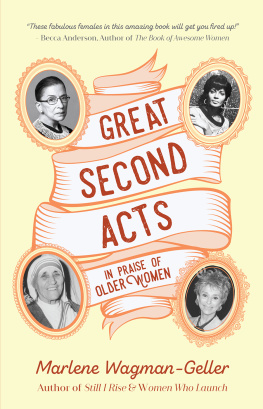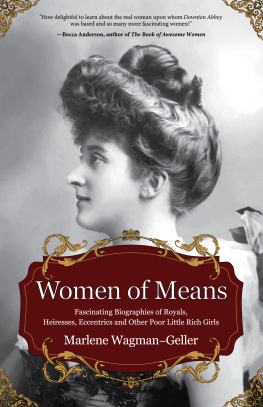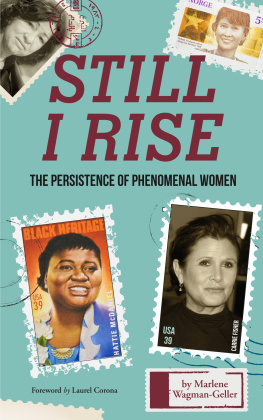
Great
Second
Acts
Also by Marlene Wagman-Geller
Women Who Launch: Women Who Shattered Glass Ceilings
Still I Rise: The Persistence of Phenomenal Women
Behind Every Great Man: The Forgotten Women Behind the Worlds Famous and Infamous
And the Rest Is History: The Famous (and Infamous) First Meetings of the Worlds Most Passionate Couples
Eureka! The Surprising Stories Behind the Ideas That Shaped the World
Once Again to Zelda: The Stories Behind Literature s Most Intriguing Dedications
Great
Second
Acts
In Praise of Older Women
Marlene Wagman-Geller

Mango Publishing
Coral Gables
Copyright 2018 Marlene Wagman-Geller
Cover & Layout Design: Jermaine Lau
Mango is an active supporter of authors rights to free speech and artistic expression in their books. The purpose of copyright is to encourage authors to produce exceptional works that enrich our culture and our open society. Uploading or distributing photos, scans or any content from this book without prior permission is theft of the authors intellectual property. Please honor the authors work as you would your own. Thank you in advance for respecting our authors rights.
For permission requests, please contact the publisher at:
Mango Publishing Group
2850 Douglas Road, 3rd Floor
Coral Gables, FL 33134 USA
For special orders, quantity sales, course adoptions and corporate sales, please email the publisher at or +1.800.509.4887.
Great Second Acts: In Praise of Older Women
Library of Congress Cataloging
ISBN: (print) 978-1-63353-822-1 (ebook) 978-1-63353-823-8
Library of Congress Control Number: 2018956901
BISAC category code: BIO022000
BIOGRAPHY & AUTOBIOGRAPHY / Women
Printed in the United States of America
In praise of older women who say to old age what Madeleine told the tiger at the zoo: Pooh, pooh.
And to the praise of my womenmy mother, Gilda Wagman, and my daughter, Jordanna Shyloh Geller.
Age cannot wither her, nor custom stale
her infinite variety
William Shakespeare (1606)
Antony and Cleopatra
Table of
Contents
With the optimism of youth, there is an inherent belief that, in the words of Dorothy from The Wizard of Oz , The dreams that you dare to dream really do come true. However, as the calendar pages turn, our aspirations tend to recede into the distance, placed on the back burner by financial survival, child-rearing, and male maintenance. Then, in a dizzying blur, we gasp at the pigment-free image staring back from the mirror, reminding us how quickly time passes. It is essential that we do not go gentle into our twilight years. Ladies who experience late-in-life reinvention are the embodiment of what Antony said about Cleopatra: Age cannot wither her / Nor custom stale / Her infinite variety.
Growing up in Toronto, Canada, my holy grail was to have my name on the spine of a book, having a seat in my own version of the Algonquin Round Table. Life did not play out that way. (Surprise, surprise.) While waiting to publish the great Canadian novel, heir apparent of Margaret Atwood, I became a high school English teacher. Although pouring knowledge into young minds is a noble pursuit, my dream of authorship haunted me.
In 1986, I moved to San Diego, had my dear daughter, and taught high school English. Over the decades, I penned various novels and received enough rejection slips to wallpaper Buckingham Palace. My aborted attempts gave me a ringside seat to the Boulevard of Broken Dreams. The proverb Hope may be a good breakfast but is a bad dinner held true. And then serendipity walked in: my second act. In 2008, after making substantial inroads on my biblically allotted threescore years and ten, Penguin published my first book, Once Again to Zelda: The Stories Behind Literatures Most Intriguing Dedications. The realization of my dream proved the truth of the old saying, Better late than never.
Conventional wisdom holds that, if a person does not write Wuthering Heights, paint Starry Night , or climb Mt. Everest before a varicose vein makes its appearance, chances are it aint gonna happen. The over-fifty set need not compare themselves to those who set the world aflame before their twenties: the French Joan of Arc was freeing her country from the British at age eighteen; the Romanian Nadia Comaneci received three gold Olympic medals at age fourteen; the Pakistani Malala Yousafzai won the Nobel Prize at age seventeen. Our youth-obsessed culture, which tends to assume ingenuity wanes as the years go by, fosters this idea. Hence, late bloomers arm-wrestle with powerful prejudice as they face those who think they are no longer viable. The message: Age delivers, along with Poligrip and orthopedic shoes, a drying of the creative juices. In such a climate, older folk may easily succumb to the belief that the great imaginative leap remains in the realm of yesteryear. The mindset becomes that it is too late, followed by the painful pang of it-could-have-been. Dorothy Parker expressed this sentiment when she wrote, Time doth flit; oh shit.
The nineteenth-century novel was the contemporary soap opera, and Charles Dickens did a number on older gals with his depiction of Miss Havisham in his novel Great Expectations. Jilted at the altar, her mansion became a mausoleum; in a decaying wedding dress with matching white hair, she existed in perpetual mourning. Her cinematic heir, Norma Desmond, dwelt on the aptly named Sunset Boulevard. Rather than look ahead, she anxiously awaited the return of a parade that had long passed her by. Another fictional character that helped foster the stereotype of women in their later years as unable to retain their marbles was Bette Daviss role in the movie Whatever Happened to Baby Jane ? The answer to the titles rhetorical question: She became a madwoman not confined to the attic and became the worst a lady can be in her twilight yearsdelusional, homicidal, sadistic. The image of the meal she served her sister, which consisted of a pet bird, is not one that can ever be unseen. In contrast, the non-celluloid Bette retained her clarity and sagely remarked, Old age is not for sissies.
Fortunately, the long-established paradigm of older women being beyond our expiration date for achievement and sanity has received a well-deserved shakedown as women have obtained late-in-life success. After all, the rings on a trunk make for the most majestic of trees. An important idea to keep in mindand yes, we still have oneis that the golden years can be rewarding creatively, emotionally, and romantically.
Maggie Kuhn, an octogenarian who proved frail bodies can mask iron spirits, called herself a little old woman. She celebrated her forced retirementa gesture of out with the old and in with the newby founding the Gray Panthers, a name derived from the radical Black Panthers. In 1972, she told the New York Times , I have gray hair, many wrinkles, and arthritis in both hands. And I celebrate my freedom from bureaucratic restraints that once held me. Kuhn refused to be defined by the year on her birth certificate.
Another kidney-punch to time was Sue Ellen Coopers Red Hat Society that proved girls just wanna have fun. Her organization is a nod to matrons who have earned their stripes, a.k.a. wrinkles and bags. The red hats are a variation of a Purple Heart: proof positive they have survived all life has dished out.
In China, the elderly members of the family are venerated patriarchs, while in Western cultures, senior citizen homes proliferate. Perhaps the finger of blame should be pointed at the German siblings Wilhelm and Johann Grimm. In their classic fairy tales, the villain was the ancient crone. She was the one whose version of hospitality was to shove Hansel and Gretel into the oven, to imprison Rapunzel in a tower, to turn into a hag to trick Snow White into eating the poisoned apple. The reason why Snow Whites stepmother replaced maternal nurturing with malice is that she was no longer the fairest in the land. Grimm indeed.
Next page











